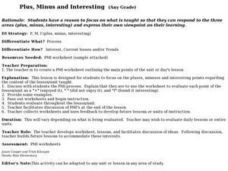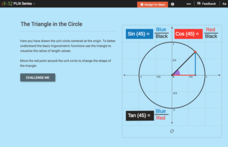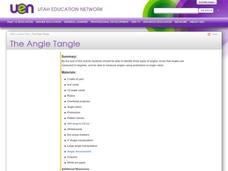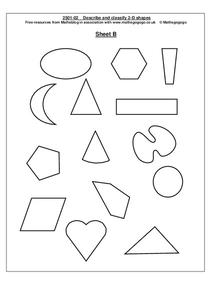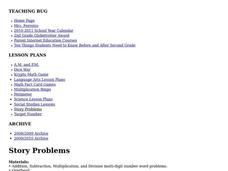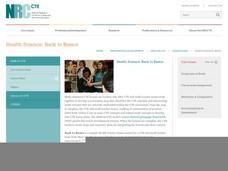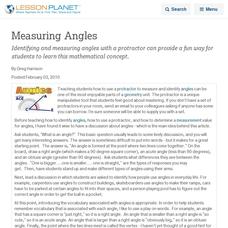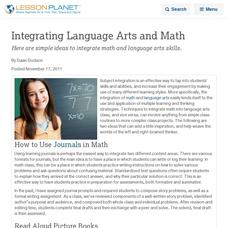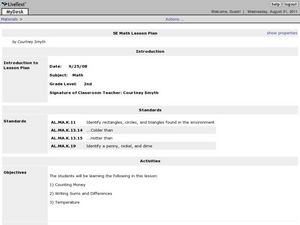Curated OER
Shorten the Length
Learn how to summarize by identifying main ideas and supporting details. Readers cross out unimportant information as they read through a text. Is it a random detail? Cross it out! They then draw a concept map, placing the main idea in...
Scholastic
Lesson 3: Essay Organizer
A three-minute exercise warms-up scholars' writing abilities in order to follow a writing process that ends in an essay. The essay's topic is a barrier and the values used to break it. Four steps include choosing a topic,...
Curriculum Corner
Guest Teacher Plans: Kindergarten
Emergencies happen. Be prepared the next time you have to call in a substitute with a lesson plan designed to meet the needs of a kindergarten class. Throughout the day, class members work with number and alphabet cards, identify numbers...
Curated OER
Plus, Minus and Interesting
Students identify the main ideas or topics of a lesson or unit using the plus, minus and interesting graphic organizer. In this main idea or topic lesson, students examine the use of the PMI graphic organizer. They describe the item they...
New York State Education Department
TASC Transition Curriculum: Workshop 5
Are video games sports? Pupils investigate this question as well as various nonfiction selections to learn more about claims and the support that defines them. All of the selections mimic the rigor on state tests and encourage close...
CK-12 Foundation
Trigonometric Functions and Angles of Rotation: The Triangle in the Circle
Go around the unit circle and create triangles. Pupils move a point around the unit circles to visualize the triangle associated with the angle in standard position. The three main trigonometric functions are defined in terms of the legs...
Curated OER
What's the Big Idea? Exercise 2
In this online interactive categorization worksheet, learners examine 12 groups of 4 words each. Students identify a title for each set of words.
Curated OER
Angles
Fourth and fifth graders investigate angles and name them according to the criteria for obtuse, acute, and right angles. They examine a human-made yarn pattern on the floor of their classroom and identify angles, vertices, and types of...
University of Kansas
Newspaper in the Classroom
Newspapers aren't only for reading—they're for learning skills, too! A journalism unit provides three lessons each for primary, intermediate, and secondary grades. Lessons include objectives, materials, vocabulary, and procedure, and...
Curated OER
Simple Inequalities
Students solve inequalities. In this inequalities instructional activity, students evaluate simple inequalities. They examine vocabulary words. Students participate in breath holding activities and write inequalities to represent the...
Curated OER
Incredible Integers!
There are three parts to this lesson on integers. In the first, learners explore positive and negative numbers on an actual painter's tape number line and by playing a "Hot Seat" game. In part two, they view a BrainPop video and work...
Teach Engineering
Forms of Linear Equations
Linear equations are all about form. The fifth part in a unit of nine works with the different equivalent forms of linear equations. Class members become familiar with each form by identifying key aspects, graphing, and converting...
Curated OER
Compound Inequalities and Graphing
Put geometry skills to the test! Learners solve compound inequalities and then graph the inequalities on a coordinate plane using their geometric skills. They identify the slope and y-intercept in order to graph correctly. I like this...
Curated OER
Narrow It Down
Students participate in a logic activity in which they identify items. In this logic activity, students work in groups as they play a questioning game that is similar to "Twenty Questions." They ask questions and rule out items in a...
Curated OER
Shapes
In this shapes worksheet, students identify shapes according to sentences that describe them. Students identify 8 shapes, but have 14 to choose from.
Curated OER
Story Problems
Youngsters learn how to solve story problems. They listen to story problems, learn how to identify important information in a problem, and observe how to solve a story problem. Pupils practice solving an addition story problem with...
Curated OER
Basic Geometry Ideas and Angle Measurement
Seventh graders explore the concept of basic geometry. In this basic geometry instructional activity, 7th graders identify the correct picture for a given vocabulary word such as midpoint, line, ray, or parallel lines. Students discuss...
National Research Center for Career and Technical Education
Health Science: Back to Basics
This lesson focuses on unit conversion, proportions, ratios, exponents, and the metric system. Discuss measurement with your math class and demonstrate how to solve several health-science word problems. Give learners a chance to visit an...
Curated OER
Measuring Angles
Identifying and measuring angles with a protractor can provide a fun way for students to learn this mathematical concept.
Curated OER
Integrating Language Arts and Math
Here are simple ideas to integrate math and language arts skills.
Curated OER
Introduction to Law of Sines
Students solve problems using the law of sines. In this sines instructional activity, students work in groups and individually to solve problems using the law of sines. They identify real life problems that require the use of...
Curated OER
Counting Money Activity
Second graders explore commerce by practicing monetary transactions. In this consumer math activity, 2nd graders practice using math functions to add and subtract different amounts of money. Students identify the different monetary units...
Curated OER
Mr. Bo Jangle, What's Your Angle?
Third graders explore angles. In this geometry lesson plan, 3rd graders identify and define acute, obtuse, and right angles. Students form angles with their bodies, find angles in picture books, and record angles found outside in their...
Curated OER
Teaching and Learning Through Objects
Students identify and interpret the function, usefulness or utitlity, form, beauty or aesthetics, and meaning, context or story, of objects and how they learn new skills and make things that they learn traditionally, by observation and...



